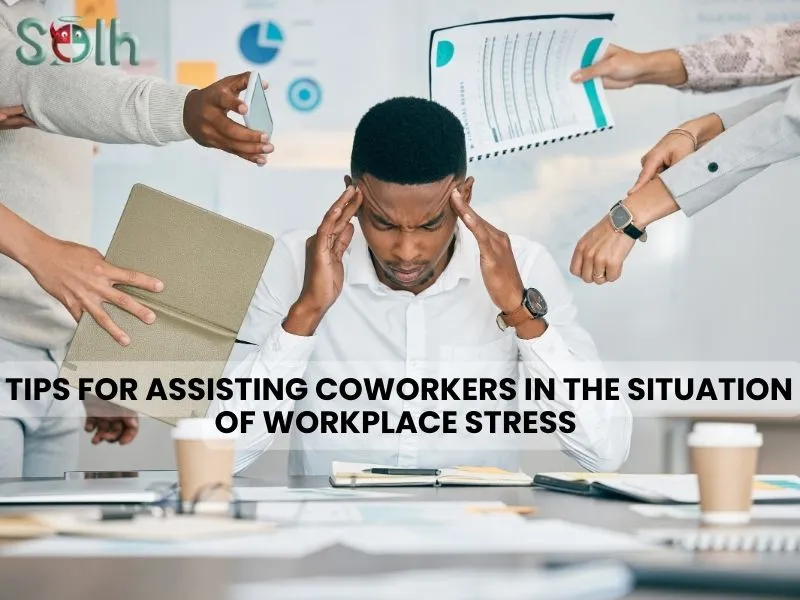Have you ever noticed changes in your coworkers' behavior? They used to be cheerful and chatty, but lately, they have become snappy and dismissive. You want to help but just don't know what to do.
In this blog, you will learn how to identify stress in others and explore a strategy for tactfully offering support. Recognizing when someone close to you is experiencing stress can be difficult, but it is important to be aware of the signs so that you can offer your help in the most effective way possible.
Workplace stress can take a toll on our physical and mental well-being, sometimes even causing depression or headaches. In more extreme cases, it can even lead to high blood pressure or heart attacks and, in some cases, cardiac arrests. When it comes to working, stressed employees are often less productive and have poorer quality output.
Common causes of stress at work
Job security, or the constant threat of losing it, casts a long shadow over workplace well-being. The fear of the unknown looms large, breeding anxiety about financial stability, healthcare access, and the very foundation of our daily lives. Not only does this constant worry threaten our sense of purpose and identity, tied as they often are to our careers, but it also spirals into a cycle of negativity. The pressure to perform intensifies, fueled by the fear of replacement, which can ironically lead to decreased productivity. Our mental and physical health takes a hit as well, with stress manifesting in anxiety, sleep disturbances, and even physical ailments. This creates a vicious cycle, where declining performance due to stress justifies the very fear that caused it in the first place. Job security, or the lack thereof, is a potent stressor that permeates the professional sphere, impacting our work and overall well-being.
Our personal expectations can be a surprising source of workplace anxiety. We may set high standards for ourselves, striving for perfection or exceeding goals by a certain margin. While ambition is commendable, these expectations can become burdens when unrealistic or uncommunicated. The pressure to constantly meet these self-imposed standards can lead to feelings of inadequacy and disappointment. Even if these expectations are unknown to colleagues or managers, failing to meet them can be a major source of stress. By acknowledging these personal pressures and setting realistic goals, we can alleviate some of the anxiety that stems from our own expectations.
Salary and advancement opportunities, while seemingly desirable aspects of a job, can turn into unexpected sources of workplace anxiety. The pressure to perform at a high level to secure a raise or promotion can be immense, leading to constant worry about meeting expectations and keeping up with competitors. This can fuel feelings of inadequacy and imposter syndrome as employees question their own abilities. Furthermore, opaque salary structures and unclear promotion paths can exacerbate this anxiety. Employees may be left wondering if their hard work is even being noticed and if that raise or promotion is truly within reach. This ambiguity can lead to feelings of frustration and a lack of control over their careers, further intensifying workplace anxiety.
Work-Life Balance, often touted as a solution to stress, can itself become a source of workplace anxiety. The constant struggle to juggle work demands and personal obligations feels like an unending tightrope walk. The fear of failing to meet expectations, both at work and at home, breeds guilt, resentment, and exhaustion. Evenings and weekends are haunted by the specter of unanswered emails and looming deadlines, making it difficult to unwind and recharge truly. Technology further blurs the lines, with work notifications constantly interrupting personal time.
The pressure to achieve a mythical perfect balance adds another layer of anxiety. The constant feeling of inadequacy or failure creeps in when we fall short of this unrealistic ideal. The fear of missing out (FOMO) on crucial work developments or opportunities if we disconnect fuels the anxiety, making it hard to truly enjoy personal time. This paradox highlights the importance of finding a work-life balance that works for you, not a one-size-fits-all solution. Setting boundaries, advocating for flexible work arrangements, and prioritizing personal well-being are all crucial steps in transforming work-life balance from a source of stress to a strategy for managing workplace anxiety.

Workload added further pressure as it has the capability to feel like a gray cloud cast looming on the head all the time. The feeling of being buried under tasks and deadlines breeds a constant sense of being overwhelmed and out of control. This pressure makes it difficult to concentrate, leading to mistakes and procrastination, which ironically just adds to the workload and fuels the anxiety cycle. Burnout, a state of emotional and physical exhaustion, becomes a looming threat, further impacting health and well-being. The physical toll manifests in headaches, sleep problems, and irritability, which can strain relationships with colleagues and exacerbate the already tense atmosphere. Effectively managing workloads and ensuring employees have the resources they need is crucial to breaking this cycle and fostering a workplace where anxiety doesn't reign supreme.
Work Environment stands as one of the major reasons as the environment is one of the major aspects that shape one's perception and attitude towards events. Lack of support from colleagues or managers can leave us feeling isolated and hesitant to seek help, which can worsen anxieties around performance. Toxic cultures filled with negativity, gossip, or bullying create a constant state of being on edge. Unclear expectations, mixed messages, or a lack of transparency make it hard to feel secure in our work, breeding confusion and worry about mistakes. Even the physical space can play a role. Cramped quarters, noise, and uncomfortable furniture can be constant stressors, impacting focus and well-being. Perhaps the most anxiety-provoking factor is a lack of control. Feeling like a cog in the machine, unable to influence workload, schedule, or even the work environment itself, can be incredibly disempowering. By prioritizing a supportive, positive, and communicative work environment, employers can dramatically reduce this anxiety, fostering a space where employees feel valued and empowered to thrive.
Here are simple but effective strategies for coping with work stress like a pro:
Practice mindfulness
When faced with a challenge or pressure at work, our minds often jump to the past (replaying mistakes) or the future (catastrophizing outcomes). This mental time travel fuels stress and hinders clear thinking. Present-moment awareness acts as an anchor. By focusing on what's happening right now - our breath, the physical sensations in our body, the details of the task at hand - we can detach from the emotional whirlwind. This allows us to observe our thoughts and feelings without judgment, recognizing unproductive patterns and choosing more helpful responses. With a calmer mind, we can assess the situation accurately, make better decisions, and navigate the stressor more effectively. Essentially, present-moment awareness empowers us to respond rather than react, transforming stressful situations into opportunities for growth and accomplishment.
Set short-term goals
In the pursuit of achievement, setting unrealistic goals can backfire, leading to a constant state of overwhelm and hindering our ability to stay calm. Goals that are too ambitious often feel like mountains to climb, leaving us feeling discouraged and paralyzed by the sheer size of the task. This can trigger negative emotions and fuel stress. However, setting realistic goals that are achievable within a specific timeframe empowers us. Completing smaller, attainable tasks provides a sense of accomplishment, boosting our confidence and motivation. This regular infusion of progress allows us to re-evaluate our workload and maintain perspective. We can see the bigger goal within reach but broken down into manageable steps, making the entire process feel less daunting and more achievable. This keeps us calm, focused, and moving steadily toward our ultimate objective.
Take frequent breaks
In the pursuit of achievement, setting unrealistic goals can backfire, leading to a constant state of overwhelm and hindering our ability to stay calm. Goals that are too ambitious often feel like mountains to climb, leaving us feeling discouraged and paralyzed by the sheer size of the task.
This can trigger negative emotions and fuel stress. However, setting realistic goals that are
achievable within a specific timeframe empowers us. Completing smaller, attainable tasks provides a sense of accomplishment, boosting our confidence and motivation. This regular infusion of progress allows us to re-evaluate our workload and maintain perspective. We can see the bigger goal within reach but broken down into manageable steps, making the entire process feel less daunting and more achievable. This keeps us calm, focused, and moving steadily toward our ultimate objective.
Emotions Tracker
Try writing down your feelings and emotions in a journal to understand the pattern of your behavior and its consequences.
In the journal, answer the three WHATS
-What event triggered the emotion?
-What did you feel?
-What did you do at the time?
You must understand that too much stress can kick us into "fight or flight" mode. Being the CEO of your own life means you have the ability to steer your thoughts and actions to manage stress in a way that improves your work and home life. If you need a mental health day or time to bond with friends and family, don't hesitate to ask for it. Implementing one or two of the strategies on this list could make a big difference in how you live and work.
Help yourself and your coworkers to learn how to manage and reduce stress today on the Solh Wellness App.



